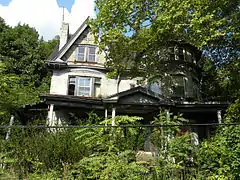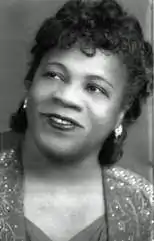Mary Cardwell Dawson
Mary Lucinda Cardwell Dawson (1894-1962) was an American musician and teacher and the founding director of the National Negro Opera Company (NNOC).[1]

Mary Cardwell Dawson | |
|---|---|
 | |
| Born | Mary Lucinda Cardwell 1894 Madison, North Carolina |
| Died | 1962 (aged 67–68) |
| Nationality | American |
| Occupation | Opera director, Educator |
| Spouse(s) | Walter Dawson (m. 1927) |
Biography
Dawson née Cardwell was born in 1894 in Madison, North Carolina.[2] She studied music at the New England Conservatory of Music in Boston graduating in 1925.[3] She continued her studies at the Chicago Musical College.[4] In the late 1920s, she married Walter Dawson, a master electrician, and they moved to Pittsburgh, Pennsylvania.[3]
In 1927, Dawson opened the Cardwell Dawson School of Music in the Homewood neighborhood of Pittsburgh, which remained open until 1941.[5] Dawson also organized the Cardwell Dawson Choir.[6]
After presenting the opera Aida at the National Association of Negro Musicians convention of 1941, Dawson launched her National Negro Opera Company (NNOC) later that same year with a performance at Pittsburgh's Syria Mosque.[1] The star was La Julia Rhea, and other members included Minto Cato, Carol Brice, Robert McFerrin, and Lillian Evanti. NNOC mounted productions in Washington D.C., New York City, Chicago, and Pittsburgh.[4]
Dawson was devoted to bringing opera to African American audiences. She organized opera guilds in Baltimore, Chicago, Cleveland, Detroit, Washington, D.C., Newark, and New York. She trained hundreds of African American youth to sing opera.[3]
In 1961, Dawson was appointed to the National Music Committee by President John F. Kennedy.[4]
Dawson died in 1962.[3]
Further reading
References
- O'Donnell, Bill (2020-09-28). "Black Opera Company's Historic Pittsburgh Headquarters Called 'Endangered' By National Group". WESA FM. Pittsburgh, Pennsylvania. Retrieved 2020-09-28.
- Bryan, Karen M. (2003). "Radiating a Hope: Mary Cardwell Dawson as Educator and Activist". Journal of Historical Research in Music Education. 25 (1): 20–35. doi:10.1177/153660060302500104. JSTOR 40215275.
- Kagawa, Grant (7 April 2011). "Mary Lucinda Dawson (1894–1962)". BlackPast. Retrieved 8 February 2019.
- "Mary Cardwell Dawson". Pittsburgh Music History. Retrieved 8 February 2019.
- Jones, Diana Nelson (1 August 1999). "An irrepressible voice". Pittsburgh Post-Gazette. Retrieved 8 February 2019.
- "Mary Cardwell Dawson". Duke University Library. Retrieved 8 February 2019.
- "National Negro Opera Company Programs and Promotional Materials: Henry P. Whitehead Collection". Anacostia Community Museum Archives. Smithsonian Digital Volunteers: Transcription Center. Retrieved 8 February 2019.
- Altman, Susan (1997). Encyclopedia African-American Heritage. New York: Facts on File. ISBN 978-0-8160-3289-1.